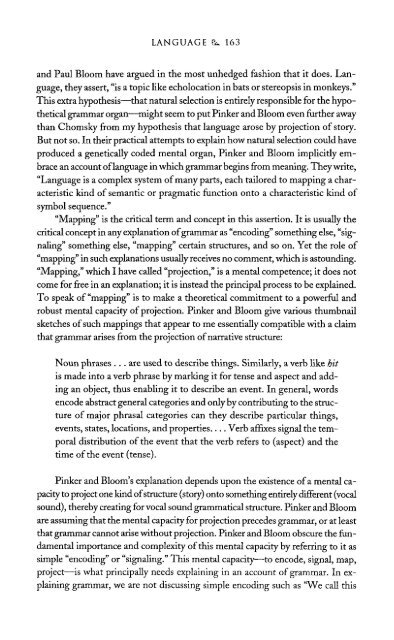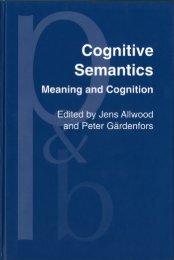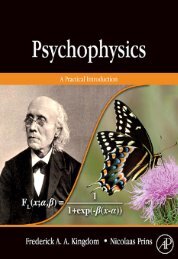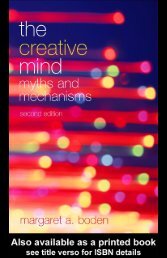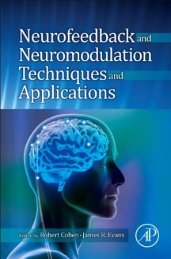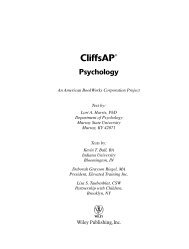The Literary Mind.pdf
The Literary Mind.pdf
The Literary Mind.pdf
You also want an ePaper? Increase the reach of your titles
YUMPU automatically turns print PDFs into web optimized ePapers that Google loves.
LANGUAGE 163<br />
and Paul Bloom have argued in the most unhedged fashion that it does. Language,<br />
they assert, "is a topic like echolocation in bats or stereopsis in monkeys."<br />
This extra hypothesis—that natural selection is entirely responsible for the hypothetical<br />
grammar organ—might seem to put Pinker and Bloom even further away<br />
than Chomsky from my hypothesis that language arose by projection of story.<br />
But not so. In their practical attempts to explain how natural selection could have<br />
produced a genetically coded mental organ, Pinker and Bloom implicitly embrace<br />
an account of language in which grammar begins from meaning. <strong>The</strong>y write,<br />
"Language is a complex system of many parts, each tailored to mapping a characteristic<br />
kind of semantic or pragmatic function onto a characteristic kind of<br />
symbol sequence."<br />
"Mapping" is the critical term and concept in this assertion. It is usually the<br />
critical concept in any explanation of grammar as "encoding" something else, "signaling"<br />
something else, "mapping" certain structures, and so on. Yet the role of<br />
"mapping" in such explanations usually receives no comment, which is astounding.<br />
"Mapping," which I have called "projection," is a mental competence; it does not<br />
come for free in an explanation; it is instead the principal process to be explained.<br />
To speak of "mapping" is to make a theoretical commitment to a powerful and<br />
robust mental capacity of projection. Pinker and Bloom give various thumbnail<br />
sketches of such mappings that appear to me essentially compatible with a claim<br />
that grammar arises from the projection of narrative structure:<br />
Noun phrases ... are used to describe things. Similarly, a verb like hit<br />
is made into a verb phrase by marking it for tense and aspect and adding<br />
an object, thus enabling it to describe an event. In general, words<br />
encode abstract general categories and only by contributing to the structure<br />
of major phrasal categories can they describe particular things,<br />
events, states, locations, and properties Verb affixes signal the temporal<br />
distribution of the event that the verb refers to (aspect) and the<br />
time of the event (tense).<br />
Pinker and Bloom's explanation depends upon the existence of a mental capacity<br />
to project one kind of structure (story) onto something entirely different (vocal<br />
sound), thereby creating for vocal sound grammatical structure. Pinker and Bloom<br />
are assuming that the mental capacity for projection precedes grammar, or at least<br />
that grammar cannot arise without projection. Pinker and Bloom obscure the fundamental<br />
importance and complexity of this mental capacity by referring to it as<br />
simple "encoding" or "signaling." This mental capacity—to encode, signal, map,<br />
project—is what principally needs explaining in an account of grammar. In explaining<br />
grammar, we are not discussing simple encoding such as "We call this


